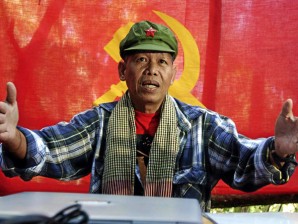Military believes ‘Ka Roger’ may have died much earlier

CONFIRMED DEAD Former NPA spokesman Gregorio Rosal speaks at a press conference in Mountain Province on Jan. 8, 2004. Also known as Ka Roger, Rosal was confirmed dead by the Communist Party of the Philippines on Sunday, October 09, 2011. PDI PHOTO/JOAN BONDOC
LUCENA CITY—The top official of the military’s Southern Luzon Command on Monday expressed doubt about the true date of death of former Communist Party of the Philippines spokesperson Gregorio “Ka Roger” Rosal who, according to the party, died in June after suffering a heart attack.
“There is a conflict in the reported date of his death. All rebel returnees and captured NPA (New People’s Army) rebels in 2010 and this year said that Ka Roger had not been seen since 2009,” Lieutenant General Roland Detabali, Solcom commander, said in a phone interview.
Detabali said he was puzzled as to why the communist leadership delayed announcing Rosal’s death. He said he could only believe that it was “to also delay the demoralization among their ranks and to continue their extortion activities.”
Communist agenda
In Manila, Armed Forces of the Philippines public affairs chief Colonel Arnulfo Burgos Jr. said the delay in disclosing Rosal’s death served the communists’ agenda.
Article continues after this advertisement“Why did they come out with the news only now?” Burgos asked. “It’s more of the timing, that the news (of Rosal’s death) was released on Sunday. They have a motive,” he added.
Article continues after this advertisementThe CPP announced Rosal’s death on Sunday, on the same day that the New People’s Army released Mayor Henry Dano of Lingig, Surigao del Norte, and his two security escorts whom they kidnapped on August 6.
The mayor and his bodyguards were released in New Visayas village in Trento, Agusan del Sur.
Burgos said the excuse offered by the CPP for the delayed announcement was not plausible since the rebels could have easily relayed the news by mobile phone or the Internet.
The CPP attributed the delay in announcing the death of Rosal, a native of Ibaan town in Batangas, to “intense military operations” which prevented party organs from immediately informing his two daughters and siblings.
Rosal’s wife, Rosemarie Dumanais, alias “Ka Soly,” was killed in an encounter with government forces in the hinterlands of Mauban, Quezon, on February 7.
Serve as a lesson
Burgos said Rosal’s death “should serve as a lesson to our countrymen who have gone astray to stop resorting to armed struggle.”
He said Rosal’s followers would be demoralized that he died without proper care in a hospital.
“Somehow he has followers and they have seen what happened to Ka Roger. Maybe they will now have the chance to think and realize that this is not the right way,” Burgos said.
Colonel Eduardo Año, commander of the Army’s 201st Infantry Brigade operating in Quezon, said he and his officers also believed that Rosal died much earlier than June 22.
He disclosed that demoralization was rife among rebels in southern Luzon, prompted by the failure of the CPP leadership to properly care for and provide for the medical needs of Rosal, while some of their leaders, particularly Jose Maria Sison, were “living well” in the Netherlands.
Burgos said that the AFP had offered medical assistance to Rosal last year when it got word that he had fallen gravely ill.
Burgos said they would have allowed Rosal to be treated in a military hospital, in the same way that top NPA commander Tirso Alcantara was treated after being wounded during his capture last January near Lucena City.